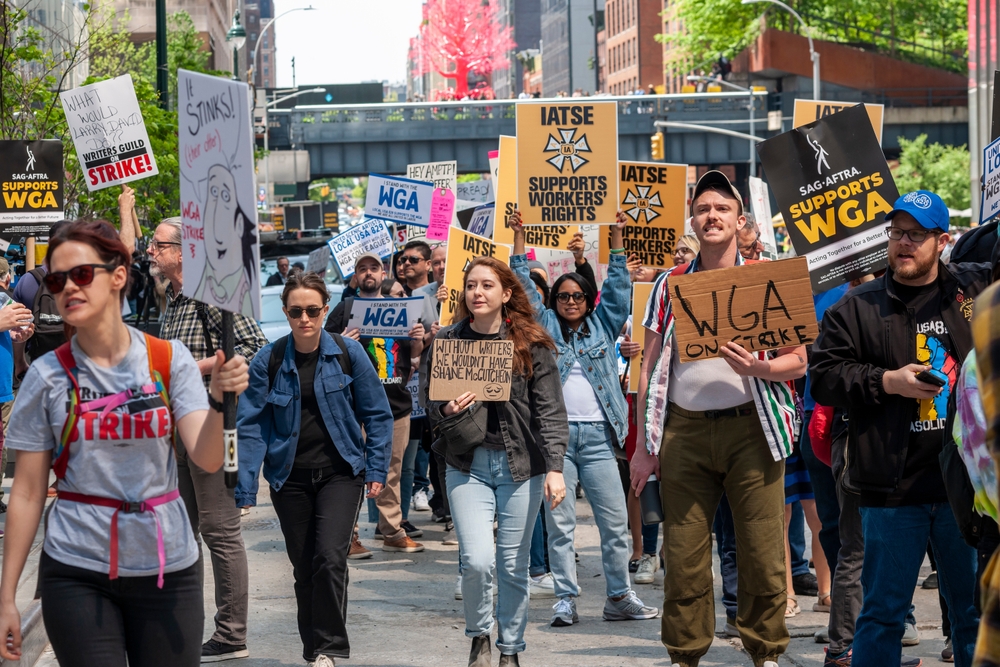65,000 members of the Screen Actors Guild – American Federation of Television and Radio Artists (SAG-AFTRA) have gone on strike, the first dual strike alongside the Writers Guild of America (WGA) in 60 years.
The US film industry has ground to a bitter, stuttering halt as actors, writers, and other film and TV professionals join a historic strike, the first of its kind since 1960.
The Screen Actors Guild (SAG) is advocating for fairer profit sharing, improved working conditions, and assurances regarding AI. The union is demanding guarantees that AI-generated faces and voices – also called digital twins – won’t replace actors.
During the strike, actors are barred from participating in films or promoting their existing work.
The sequels to major film franchises such as Avatar and Gladiator face interruptions, and large-scale industry events like the Emmys and Comic-Con face postponement.
Other productions that could be hit include Deadpool 3, starring Ryan Reynolds and Hugh Jackman, Tim Burton’s sequel to Beetlejuice, and a film adaptation of the musical Wicked.
HBO’s House of the Dragon series, the second season of Netflix’s The Sandman, and Fox’s Family Guy and The Simpsons could also face disruption.
In response, US networks are bolstering their line-up of ‘unscripted content,’ like The Masked Singer, Survivor, and Kitchen Nightmares, for their fall schedules.
AI a key point of contention
Some of the most prominent names in Hollywood are talking about AI in what has been a momentous piece of off-screen TV and film history. George Clooney, Jessica Chastain, and Matt Damon have publicly backed the strike.
Concerns regarding AI and digital replicas were met with counter-proposals from big studios.
SAG-AFTRA President Fran Drescher: “How they plead poverty that they are losing money left and right when they give $100 millions to their CEOs.”
“If we don’t stand tall right now, we are all going to be in jeopardy of being replaced by machines” pic.twitter.com/zIIsNQjZHa
— philip lewis (@Phil_Lewis_) July 13, 2023
The Alliance of Motion Picture and Television Producers (AMPTP), representing producers, studios, and streamers, offered SAG-AFTRA a “groundbreaking AI proposal.”
The proposal claims to protect performers’ digital copies and mandates consent from performers for creating and using digital replicas.
However, Duncan Crabtree-Ireland, SAG’s national executive director and chief negotiator, quickly countered this proposition.
He said, “In that groundbreaking AI proposal, they proposed that our background performers should be able to be scanned, get paid for one day’s pay, and their company should own that scan, their image, their likeness, and should be able to use it for the rest of eternity in any project they want, with no consent and no compensation. If you think that’s a groundbreaking proposal, I suggest you think again.”
Apart from anxiety surrounding AI, the SAG also demands that streaming services provide actors with higher base pay and residuals, which are payments from reruns of films and shows they’ve starred in.
Fran Drescher, SAG’s president, considers the strike a pivotal moment for actors in the industry. She decries the prioritization of “Wall Street and greed” by employers, who she accuses of ignoring the contributions of the creatives that power the industry.
The strike’s impact might also reach the UK if US production companies decide to move filming overseas due to the strike.
In response, British union Equity warned US companies that it would closely monitor any attempts to shift productions to the UK.
Simultaneously, another strike by the 11,500 members of the Writers Guild of America demanding better pay and working conditions has been ongoing since May 2. This “double strike” by both unions is the first of its kind since 1960, and the most recent actors’ strike took place in 1980.
As the industry grapples with the strike, Disney’s chief executive Bob Iger expressed concern about the strike’s impact on an industry still recovering from the pandemic.
“This is the worst time in the world to add to that disruption,” Iger commented.
Another union, the Directors Guild of America (DGA), negotiated an agreement in June and will not participate in the strike.
Solidarity against AI’s potentially harmful impacts will be warmly welcomed across other industries that face similar risks.
Hollywood is often at the cutting edge, and even though the credits have stopped rolling, people are eager to see the next chapter in this momentous strike.





